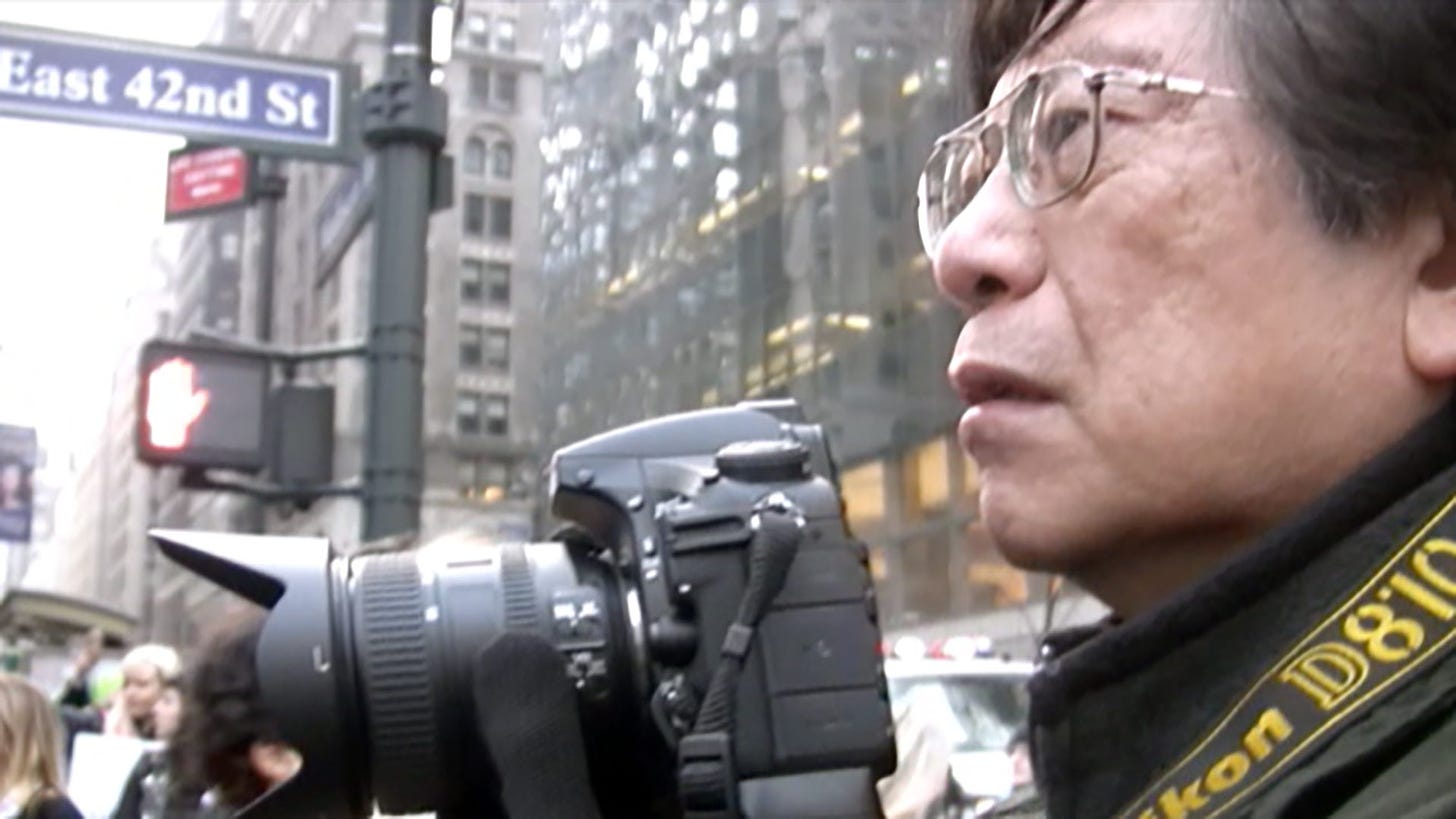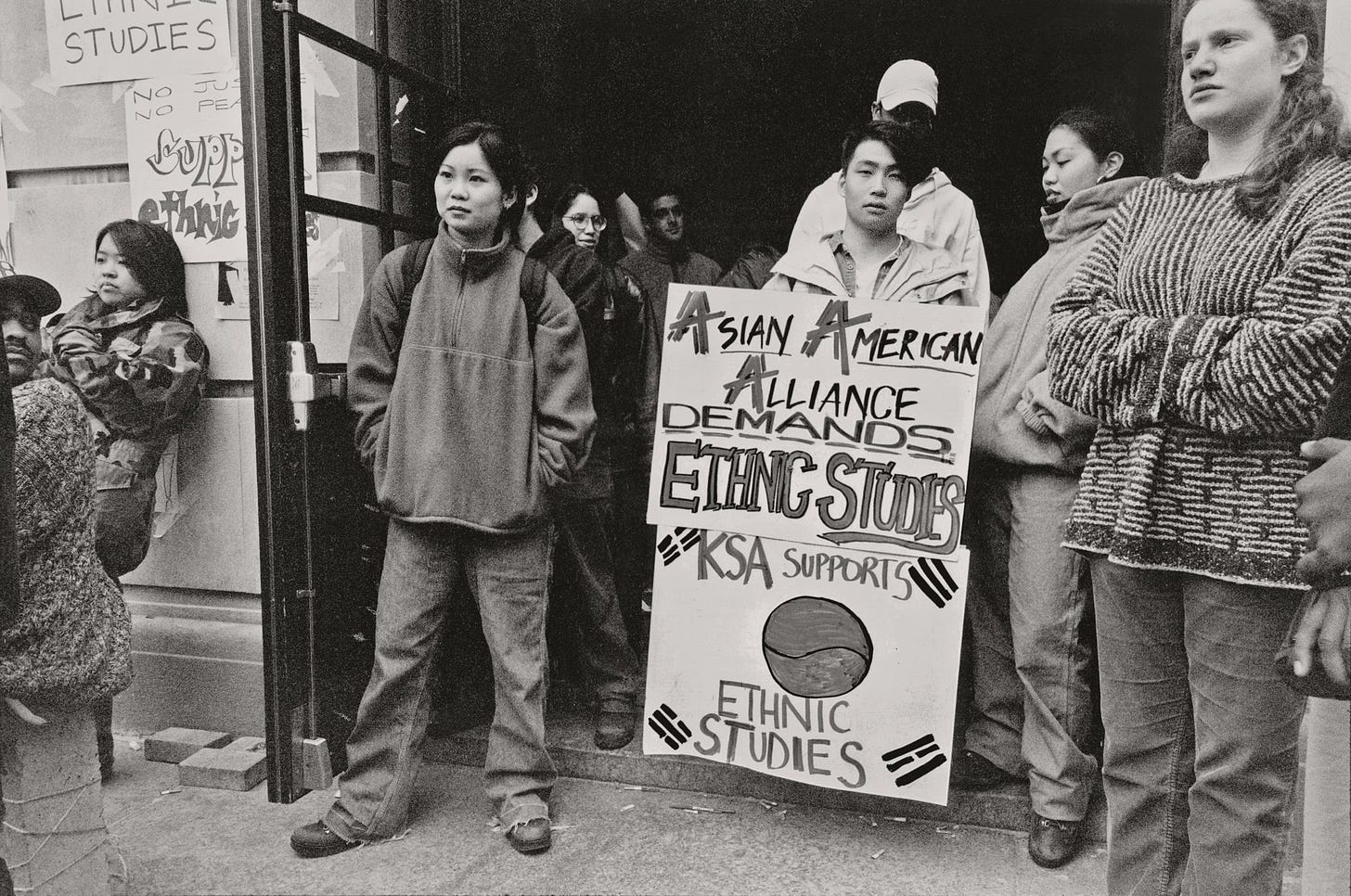Photographer Corky Lee on 42nd Street. Photo credit: Jennifer Takaki/Wikimedia Commons
On July 23, 2024, Vice President Kamala Harris reached the threshold of Democratic National Convention delegates that she needed to become the party’s de facto presidential nominee. In the two days since President Joe Biden had ceded the nomination, a diverse party had become re-energized around the 2024 race and its second, historic, multiracial nominee. While Harris would not be the first woman, or the first African American, at the top of the Democratic ticket, she would be the first Black woman and the first Asian-American woman. The daughter of immigrants, a Jamaican father and a South Asian mother, Kamala Harris will make history in her own right.
It's a sweet moment. Harris’s political achievement is a signal that Asian Americans have arrived in United States politics. Significantly, if she is elected, Harris will take office in January 2025, exactly sixty years since Hawaii’s Patsy Takemato Mink became the first woman of color and the first Asian-American woman to be sworn in to Congress.
Yet, Harris’s elevation coincides with another surge in anti-Asian hate. While the United States has a long history of vilifying immigrants from Asian nations and their American descendants, that xenophobia was purposefully revived by former President Donald J. Trump and his Republican allies, who have targeted China and its people as an economic and physical danger to the United States.
By 2020, as Covid-19 ravaged communities, Trump and his allies labeled it a “Chinese virus” and the “Kung Flu,” reviving old tropes about immigrants, and specifically Asian immigrants, as carriers of disease. Chinese scholars and scientists have been targeted. In 2023, when he was competing with Trump for the Republican nomination, Florida Governor Ron DeSantis passed discriminatory legislation that, among other things, prohibited Chinese nationals from purchasing real estate, a painful reminder of pre-World War II discrimination that rendered all Asian immigrants as perpetual second-class citizens.
Not coincidentally, random, violent attacks on Asian-Americans have surged in the United States. One of the first things the new Biden-Harris administration did in 2021 was to strengthen federal hate crimes laws, with special attention to Asian-American victims of violence.
But you can’t tell this political story without also talking about over a century of Asian American activism. Immigrants and their descendants made themselves visible by building vibrant, physical communities that welcomed generation after generation of newcomers from multiple nations. From these communities, they fought back against racism and discrimination in the courts, formed unions, volunteered for military service, raised families, claimed the right to education, made art, mounted demonstrations, and formed businesses.
One activist who documented this Asian American history in pictures until his death from COVID in 2021 was New York City photographer Corky Lee. A college history major and graduate of the city’s public education system, Lee began life as a conscientious objector and housing organizer. For almost fifty years, Lee documented New York City’s Chinatown, mostly in black and white. Hundreds of Lee’s photographs—Asian Americans living, working, striking, celebrating, protesting, and taking part in every activity that occurs in a now-shrinking part of the city—are now available, along with accompanying essays, in Corky Lee’s Asian America: Fifty Years of Photographic Justice (Penguin/Random House, 2024). It’s edited by the artist Chee Wang Ng and my friend, Columbia University historian Mae Ngai.
Reprinted with permission from “Corky Lee's Asian America: Fifty Years of Photographic Justice.” Copyright © 2024 by the Estate of Corky Lee, Mae Ngai, and Chee Wang Ng. Published by Clarkson Potter, an imprint of the Crown Publishing Group, a division of Penguin Random House LLC, New York.
Show notes:
Two Bridges Neighborhood Council, where Corky Lee began his activist career, still exists and provides services in Lower Manhattan.
Mae mentions the Basement Workshop, where Lee began to work with other politicized Asian American artists: you can learn more about it here.
Claire brings up the fact that Lee modeled himself on the photographer Weegee, who chronicled New York’s demimonde from the 1930s to the 1960s. Listeners who want to learn more may want to read Christopher Bonanos, Flash: The Making of Weegee the Famous (Picador, 2019).
Listeners who want to dig more deeply into the history of Asians in America may wish to consult Mae Ngai, Impossible Subjects: Illegal Aliens and the Making of Modern America (Princeton University Press, 2014).
Claire and Mae discuss Lee’s restating of the famous “Golden Spike” photograph, a moment of national reunification in 1869 when the two coasts were united by rail. That site is now part of the National Parks System.
Claire references the effort to keep Philadelphia from building a new basketball arena in that city’s Chinatown.
Listeners who want to know more about the emergence and evolution of Chinatowns across the country may wish to consult Bonnie Tsui, American Chinatown: A People's History of Five Neighborhoods (Free Press, 2010).
Claire and Mae discuss the controversy over a new municipal jail that New York City is trying to build in Chinatown.
You can download this podcast here or subscribe for free on Apple iTunes, Spotify, Google Podcasts, or Soundcloud. You can also keep up with Political Junkie content and watch me indulge my slightly perverse sense of humor on Instagram, Threads, and TikTok.
If you enjoyed this episode, why not try:
Episode 53, Nobody Else Has My Eyes: A conversation with historian and visual artist Nell Irvin Painter about her new book, "I Just Keep Talking: A Life in Essays."
Episode 43, Where In the World Is Merze Tate? A conversation with historian Barbara Savage about freedom, independence, and her new biography, "Merze Tate: The Global Odyssey of a Black Woman Scholar."
Episode 16, The Sunlit Path of Racial Justice: A conversation with historian Matthew Pratt Guterl about his book, "Skinfolk: A Memoir."
And here’s a bonus: all new annual paid subscriptions include a free copy of my book about political media, Political Junkies: From Talk Radio to Twitter, How Alternative Media Hooked Us on Politics and Broke Our Democracy (Basic Books, 2020.)














Share this post